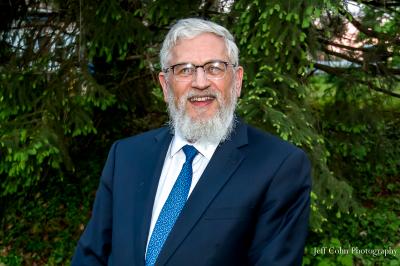As I am privileged this week to walk, together with my wife, my son Mutti down to his chuppah, I would like to take this opportunity to share some of my personal feelings at this exciting time.
Many have the custom to stand up for the chosson and kallah as they approach the chuppah.
There is no identified source for this. Some suggest it is based on the notion of chosson domeh l'melech — a groom is compared to a king, and thus deserving of honor.
The great Talmudist, philosopher, and master teacher, the ineffable Rav Yosef Dov Soloveitchik, famed Rosh Hayeshiva of Yeshiva University, pondered aloud this question. He discounted the analogy to a king since it is only after the act of kiddushin that he first becomes a 'chosson'.
He touchingly suggested that perhaps it is based on the Mishna in Bikkurim that describes how when those who brought their ‘first fruits’ to Yerushalayim, to present this gift to the Kohen before the altar in the Bais HaMikdash, they were greeted by the skilled artisans of Jerusalem who would stand up before them and greet them. (Bikkurim 3 3) (Thanks to Mr. Stanley Labovitz who shared this personal encounter with the Rav with me recently)
We are not necessarily standing up for the bride and groom per se, but for the parents who are presenting their ‘fruits’— their children, before Hashem, sanctifying their union under the chuppah.
We derive from this Mishna the general concept of standing up for anyone who engages in an act of a mitzvah.
The Baal HaTanya explains this obligation to rise and remain standing in the presence of anyone who is engaged in fulfilling a commandment is because G-d dwells and clothes Himself in this man’s soul at such time. (Likutei Amarim 46)
We stand not in tribute to the efforts of the parents who produced such fine fruit. On the contrary, when bringing Bikkurim we emphasize the privilege in being part of journey that began with our patriarchs, who defied all odds, and persevered in establishing our land, our nation. We stand in the presence of the Altar, the very location from where the earth was drawn from in the forming and creation of man. Humbled in that knowledge we declare our utter joy in the privileged and loving connection we have with Hashem, despite our diminished stature.
The Baal HaTanya teaches that Hashem is always there but the layers of distraction of our physical urges and selfish needs prevent us from seeing it with clarity. When engaging in a mitzvah properly we pare away those layers, permitting ourselves to sense Him, reflecting His presence in our joy.
These are the moments when the sense of the enveloping presence of Hashem in our lives is tangible. That reality that is visible on the faces of those who bring their Bikkurim, prods us almost instinctively to stand in reverence for the very Shechinah that is now present.
At those moments in life when we reflect on how the divine providence in our life has directed us in every step we have taken, we ‘respond’ with joy and enthusiasm.
The declaration of the one who brings Bikkurim, which expresses this very theme, is introduced with the command וענית — and you shall ‘respond’.
Response is a reply to a call. But who is the bringer ‘answering’ to?
Similarly, when Miriam chimes in at the splitting of the sea with her song, there too it states ותען — and she ‘responded’. But no one called to her?
The Tzror HaMor explains that these two instances represent a response to the realization of Hashem’s constant and devoted involvement that provokes a joyous song of appreciation.
We stand while reciting Az Yashir. This too is not clearly sourced. But we are summoned to recite Az Yashir with a sense of joy of having experienced it as if we physically crossed the sea.
Perhaps it is teaching us that when one can sense the divine involvement in one’s daily life with the same awareness our ancestors felt at the crossing of the sea, then that immanence compels us to stand with Him.
May we feel Hashem’s presence every moment of our lives. But certainly, when we are fortunate to perceive how the sum of our lives and Hashem’s guidance during that journey is so evident and present, we must respond to that reality by rejoicing and standing up to His calling in every facet of our lives.
I am standing at one of those moments. Thank You Hashem for always being there.
What a joy, what a privilege. May we all live with that sense every moment of our existence!
באהבה,
צבי יהודה טייכמאן



















